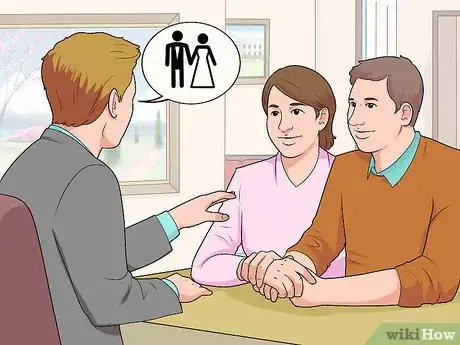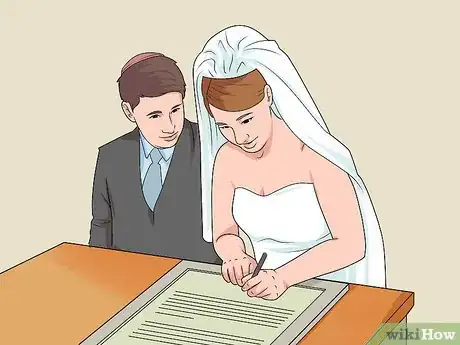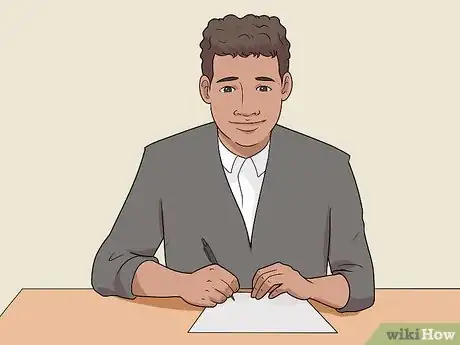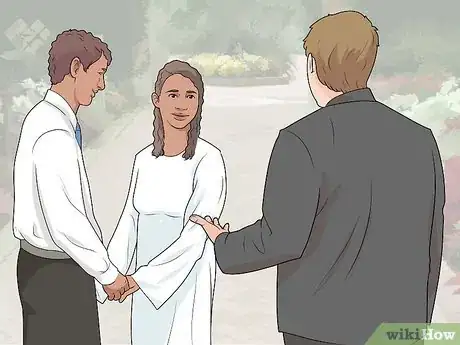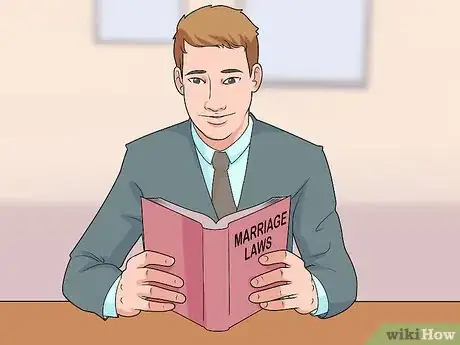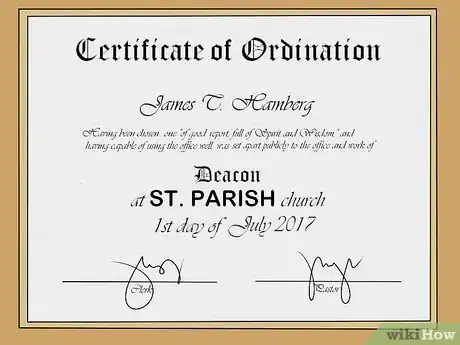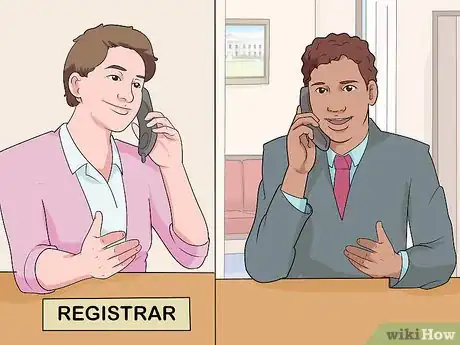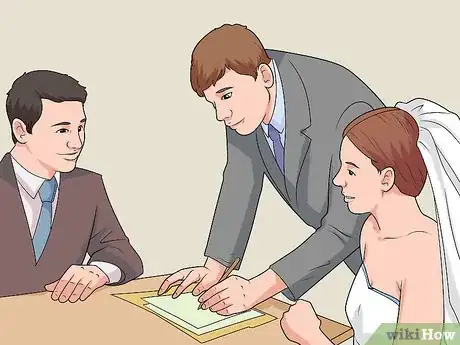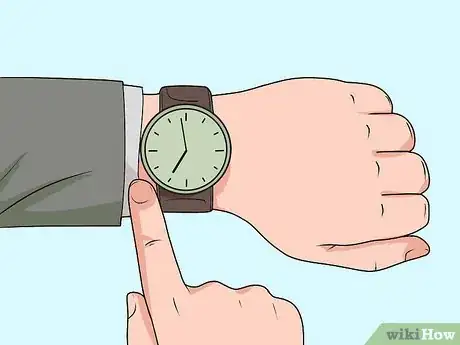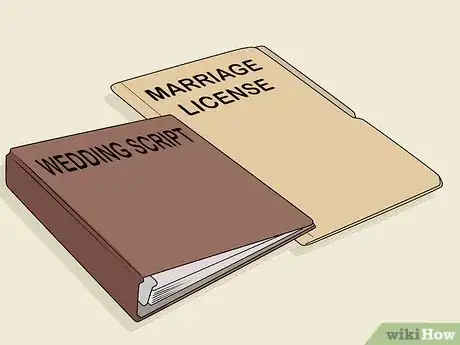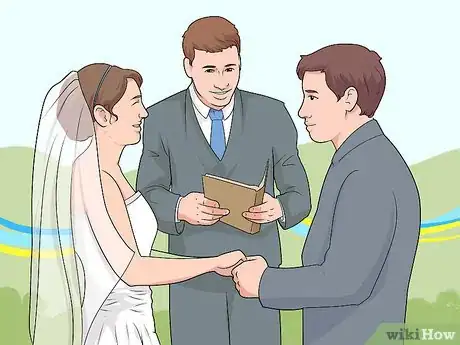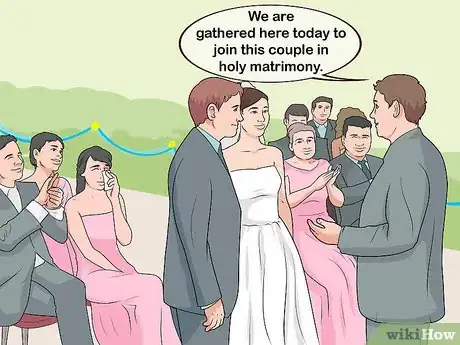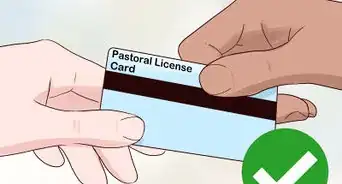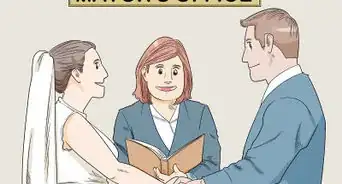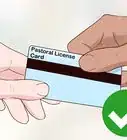This article was co-authored by Hope Mirlis and by wikiHow staff writer, Megaera Lorenz, PhD. Hope Mirlis is a registered Wedding Officiant, an Ordained Non-Denominational Minister, and a Certified Yoga Instructor specializing in pre-wedding mental health. She is the Founder of A More Perfect Union, a premarital counseling business. She has worked as a counselor and officiant for over eight years and has helped hundreds of couples strengthen their relationships. She has a MFA in Dramatic Arts from the University of California, Davis.
There are 7 references cited in this article, which can be found at the bottom of the page.
This article has been viewed 290,208 times.
Being asked to conduct a wedding ceremony for a friend or family member is a serious responsibility, but it can also be a lot of fun! Every couple is unique, and the same is true of wedding ceremonies – there’s no one right way to conduct one. Talk to the couple ahead of time to figure out how to make the experience personal, fulfilling, and joyful for them and for you. Before the ceremony, familiarize yourself with the relevant laws in your area, and make sure you are qualified to officiate. Prepare in advance so that you can conduct the ceremony smoothly and with confidence.
Steps
Planning the Ceremony
-
1Discuss the ceremony with the couple. When you start putting together a ceremony, it’s important that you are on the same page as the couple. Meet with them early in the process to talk about what they want and expect from you. Keep in touch as you plan out the ceremony to make sure you are on the right track.[1] Ask the couple about:
- What kind of tone they want the ceremony to have. Are they looking for traditional, trendy, or off-beat? Solemn, or light-hearted? Religious or secular?
- Whether they have any specific expectations about the structure of the ceremony.
- Whether there are any subjects they want you to touch on (or avoid) during your introductory speech.
-
2Follow any religious guidelines, if applicable. If the wedding is a religious one, you may need to include specific elements in the ceremony. Consult with the couple about their spiritual needs, and familiarize yourself with the rules and traditions associated with weddings in their religion.
- For example, in a traditional Jewish wedding ceremony, the officiant is required to read a special marriage contract, called the ketubah, out loud.[2]
Advertisement -
3Write a script. It is important to know ahead of time what you plan to say, and how you plan to say it. This is especially crucial if the ceremony will be very complex, formal, or traditional. If you are comfortable with public speaking, or if you’ve performed similar ceremonies before, an outline may be enough. Otherwise, be on the safe side and write out everything you want to say.
- Make sure your script contains all the crucial parts of the ceremony. In many places, a wedding ceremony is not legally binding unless it includes the “declaration of intent” from the couple (e.g., “Do you, Gussie, take Madeline to be your lawfully wedded wife?” “I do.”) and the pronouncement from the officiant (e.g. "I now pronounce you..."[3]
- If the couple has decided to compose their own vows, leave space in the script for their part of the ceremony.
- If you’re not sure how to begin, check around online for sample wedding scripts that match the tone and structure you are going for.
-
4Rehearse the ceremony. Make sure to give yourself plenty of time to practice the ceremony on your own before the wedding day. If the couple plans to have a wedding rehearsal, you should be involved. Practice conducting the entire ceremony as it will happen on the wedding day.[4]
- If there are places where you stumble over words, or if you find yourself getting choked up at certain points, take extra care to work on mastering those difficult passages.
Becoming a Legal Officiant
-
1Look up marriage laws in your area. The laws about who can conduct a marriage ceremony vary from one place to another. Do an internet search on local marriage laws in your area, or visit your local clerk, registrar, or other marriage authority for detailed information.
- For example, in many states in the US, you may need to be a judge, magistrate, or ordained minister in order to become an officiant.
- In other states, such as Pennsylvania, no officiant is required at all, and the couple can marry themselves as long as there are at least two witnesses present.[5]
-
2Get ordained, if you need to. If you are not already qualified to conduct a wedding ceremony, one of the easiest ways to become qualified is to get ordained as a minister. This may seem daunting, but it’s easier than it sounds. Organizations like the Universal Life Church, Open Ministry, or American Marriage Ministers can ordain you online, free of charge or for a very low price, even if you have no religious affiliation.[6]
- Some types of ordination are only valid for a limited period of time. Before trying to conduct a wedding ceremony, make sure your ordination is still valid, and renew it if necessary.[7]
-
3Contact your local marriage authority. Once you’re sure that you’re qualified to perform a marriage in your area, get in touch with your county clerk, registrar, or other local official in charge of issuing marriage licenses. Let them know that you are planning to perform a wedding ceremony, and ask what procedures you need to follow in order to make the ceremony valid.[8]
- In some areas, you may be required to present credentials, such as a certificate of ordination or a Letter of Good Standing from your ministry.
-
4Stay on top of the paperwork. While it is usually the couple’s responsibility to obtain a marriage license, it will probably be up to you to submit the signed license (and any other required documents) to the local marriage authority. Check ahead to find out how soon after the wedding the signed license must be submitted.[9]
- You and the married couple will need to sign the license in order for it to be legally binding. You may also need signatures from at least two witnesses.
Performing the Ceremony
-
1Arrive early. Weddings usually run on a pretty tight schedule. Arrive at least an hour in advance to give yourself time to relax, go over your script, and help out with any last-minute setup.
-
2Bring everything you need for the ceremony. Make sure you have your script, the marriage license, and any other documents or items you may need before you begin the ceremony. If you’re going to be reading directly from your script, put the script in an attractive book or binder.
-
3Keep it brief. There is probably a lot you want to say to (and about) the couple on their wedding day. However, your most important task is to get them married and let them shine. There will be plenty of time to share advice, toasts, and reminiscences at the reception. Keep your opening and closing remarks short, sweet, and simple.
- It may help to pick a simple theme for your introduction or sermon. For example, you might build a few short paragraphs off of a favorite quote about love, life, or marriage.[10]
-
4Help the audience feel included. A wedding is for the benefit of both the couple and the loved ones who have come to celebrate their marriage. While the couple should be the focus of the ceremony, remember to reach out to the audience as witnesses to (and participants in) the event. Thank them for their presence, and include them in your speech.
- For example, you might begin with a variation on the traditional opening, “Dearly beloved, we are gathered here today to join this couple in holy matrimony.”
-
5Have fun! A wedding is a joyous occasion. Even if the ceremony is relatively formal, aim to conduct it with a sense of happiness and celebration. As long as it’s kept respectful, a little bit of humor may not be out of place. Trust your instincts and your knowledge of the couple and the audience.
Expert Q&A
-
QuestionHow can I be a good wedding officiant?
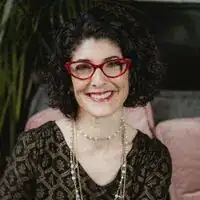 Hope MirlisHope Mirlis is a registered Wedding Officiant, an Ordained Non-Denominational Minister, and a Certified Yoga Instructor specializing in pre-wedding mental health. She is the Founder of A More Perfect Union, a premarital counseling business. She has worked as a counselor and officiant for over eight years and has helped hundreds of couples strengthen their relationships. She has a MFA in Dramatic Arts from the University of California, Davis.
Hope MirlisHope Mirlis is a registered Wedding Officiant, an Ordained Non-Denominational Minister, and a Certified Yoga Instructor specializing in pre-wedding mental health. She is the Founder of A More Perfect Union, a premarital counseling business. She has worked as a counselor and officiant for over eight years and has helped hundreds of couples strengthen their relationships. She has a MFA in Dramatic Arts from the University of California, Davis.
Wedding Officiant & Marriage Counselor Learn from an experienced officiant if you can. For the first ceremony I officiated, I got a permit from the city to perform the ceremony for friends of mine. But once I realized this was my path, I went through an ordination program. Even if you're a friend of the family, I think it's a good idea to do a good bit of research —and speak to a professional officiant—so you can write a ceremony that addresses the desires of the couple, and prepares for the unknown.
Learn from an experienced officiant if you can. For the first ceremony I officiated, I got a permit from the city to perform the ceremony for friends of mine. But once I realized this was my path, I went through an ordination program. Even if you're a friend of the family, I think it's a good idea to do a good bit of research —and speak to a professional officiant—so you can write a ceremony that addresses the desires of the couple, and prepares for the unknown. -
QuestionWhere does the ring bearer stand before the ring exchange?
 Community AnswerEach ring bearer stands behind the person whose ring he or she is bearing.
Community AnswerEach ring bearer stands behind the person whose ring he or she is bearing. -
QuestionAt what point is the wedding license signed?
 Winfred GraddickCommunity AnswerThe wedding license is signed at the conclusion of the ceremony. Once the couple has left the sanctuary and they pose for pictures, the minister can use this time to complete the signing of the license.
Winfred GraddickCommunity AnswerThe wedding license is signed at the conclusion of the ceremony. Once the couple has left the sanctuary and they pose for pictures, the minister can use this time to complete the signing of the license.
Warnings
- Because marriage laws vary by state, it is important to inquire about the requirements to conduct a legally binding wedding several months prior to the wedding date. Some states require extensive paperwork in order to become licensed, while others require only a certificate of ordination.⧼thumbs_response⧽
- In the event that something doesn't go as planned during the wedding ceremony, it is the officiant's job to keep the ceremony moving as smoothly as possible. For example, if the wedding rings are missing, the bride and groom will look to the officiant for instructions on how to proceed. Be ready to think and act quickly when something unpredictable occurs.⧼thumbs_response⧽
References
- ↑ http://offbeatbride.com/officiating-your-friends-wedding/
- ↑ http://www.chabad.org/library/article_cdo/aid/476757/jewish/Jewish-Wedding-Ceremony.htm
- ↑ https://www.theknot.com/content/friend-officiate-ceremony-how-to
- ↑ https://www.brides.com/story/how-to-perform-wedding-ceremony
- ↑ https://www.legis.state.pa.us/WU01/LI/LI/CT/HTM/23/23.HTM
- ↑ http://offbeatbride.com/how-to-become-a-wedding-officiant/
- ↑ https://www.theknot.com/content/friend-officiate-ceremony-how-to
- ↑ https://www.themonastery.org/training/weddings/performing-a-wedding-3-steps
- ↑ https://www.theknot.com/content/friend-officiate-ceremony-how-to
